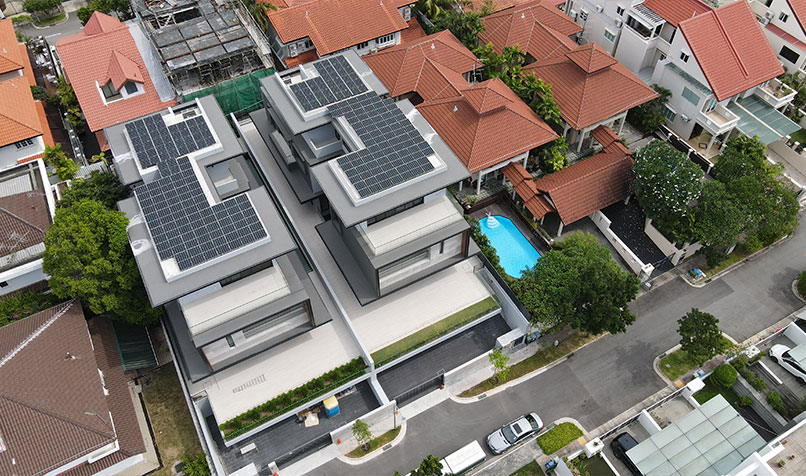Loading component...
At a glance
By Melody Tan
Singapore has announced a mildly expansionary budget aimed at securing its future in the wake of the COVID-19 pandemic.
Acknowledging inflationary pressures and global economic uncertainty, Singapore’s Deputy Prime Minister and Finance Minister Lawrence Wong laid out a budget focused on driving growth and innovation, while signalling a renewed commitment to fiscal prudence.
Innovation and productivity support

Budget 2023 contained measures targeted at encouraging small-to-medium enterprises (SMEs) to embark on transformation and innovation activities, despite the twin challenges of tighter financial conditions and higher energy prices.
The Singapore Government will extend its Enterprise Financing Scheme (EFS). This scheme enables Singaporean enterprises to more easily access trade, working capital and domestic construction project loans – to 31 March 2024.
Existing government risk-sharing of 70 per cent for EFS trade loans will continue.
The Energy Efficiency Grant has also been extended to 31 March 2024.
The grant is intended to support businesses in the food and beverage and manufacturing sectors when they invest in efficient energy equipment, and to help reduce the impact of higher electricity prices.
The National Productivity Fund received a S$4 billion boost to encourage quality investments and its scope was expanded to include further investment.
“Besides anchoring investments and deepening capabilities, we must nurture pervasive innovation across the economy, push new frontiers and differentiate ourselves in quality and value,” Wong said.
However, he added that innovation comes with risks that businesses may find challenging given slower growth and higher costs.
Wong also announced a new Enterprise Innovation Scheme that will offer enhanced tax deductions for five key activities: research and development conducted locally, the registration of intellectual property (IP), acquisition and licensing of IP rights, training courses aligned with and approved by SkillsFuture Singapore, and innovation activities carried out with polytechnics and Institutes of Technical Education (ITE).
Current tax deductions of up to 250 per cent of qualifying expenditure per activity will be raised to 400 per cent and capped at S$400,000, except innovation activities carried out with polytechnics and ITEs, which are capped at S$50,000.
“Businesses that make full use of the scheme can enjoy tax savings of nearly 70 per cent of their investment,” Wong declared.
Acknowledging that some businesses may not yet turn a profit – or have sufficient profits – to benefit from the scheme, Wong said he would give them the option to convert 20 per cent of their total qualifying expenditure into a cash pay-out up to S$20,000, allowing them to defray up to S$100,000 of qualifying expenditure.
He added that as companies grow, the government will support them in accessing capital to scale up and become globally competitive.
Through Temasek Holdings’ subsidiary Heliconia Capital, the government has mobilised investments into SMEs, with about S$1 billion committed to date. This, in turn, has catalysed around S$2 billion of additional investments into 60 participating Singapore-based enterprises.
The government plans to set aside an additional S$150 million for the SME Co-Investment Fund, to provide an additional S$300 million of private investment to support promising Singaporean SMEs.
Larger companies will receive a S$1 billion boost via the Singapore Global Enterprises Initiative, which provides customized capability-building programs.
They will also receive support from Enterprise Singapore to secure needed resources in executing growth plans and building research and development capabilities.
Support for individuals and households
“Ultimately, the value we create as an economy must benefit Singaporeans in the form of wage growth and job opportunities,” Wong said.
Enhancements were also made to the Assurance Package that was set aside in a previous budget to help Singaporeans offset the rise in the goods and services tax (GST).
An additional S$3 billion was allocated to the Assurance Package, taking its total support to S$9.6 billion.
Singapore’s GST rate was raised to 8 per cent in 2023 and will rise to 9 per cent in 2024.
With inflation being a key concern in framing this budget, cost of living support measures were targeted at lower-income families, seniors and vulnerable groups. These include employment support for seniors, progressive wage schemes for lower-wage workers, and increased help for young couples buying their first public-housing properties.
Looking ahead

Highlighting that increases in spending will need to be funded by additional revenues to ensure a balanced budget for the medium term, Wong said the overall system would nonetheless be kept fair and progressive.
One revenue-raising measure is to increase property taxes on more expensive properties. This measure may also help to cool the local property market.
Residential properties worth between S$1.5 million and S$3 million will be taxed at a higher rate of 5 per cent, up from the current 4 per cent.
Values above $3 million will attract a 6 per cent tax. These changes will affect around 15 per cent of residential properties in Singapore.
For non-residential properties, the value between S$1 million and S$1.5 million will be taxed at 4 percent from the current 3 per cent.
Values above S$1.5 million will be taxed at 5 per cent. Around 60 per cent of non-residential properties will be affected by these measures.
Wong also provided updates on developments in the global tax space, such as the Base Erosion Profit Shifting (BEPS) 2.0, and their impact on Singapore.
Singapore intends to implement Pillar Two of BEPS 2.0 from 2025 onwards and will levy a Domestic Top-Up Tax, which will raise the effective tax rate of Multinational Enterprises (MNEs) to 15 per cent.
“At the same time, we will review and update our broader suite of industry development schemes to ensure that Singapore remains competitive in attracting and retaining investments,” Wong said.
He assured MNEs that the government will continue engaging them on the topic and provide ample notice of any changes to tax rules or schemes.
The Central Provident Fund (CPF) monthly salary ceiling will be raised in stages from S$6000 to S$8000 from 1 September 2023 to 1 January 2026. This is so that it keeps pace with rising salaries.
Budget 2023 will record an overall deficit of S$0.4 billion or 0.1 per cent of Singapore’s GDP.
This is a decrease from 2022’s deficit of S$2 billion, or 0.3 per cent of the GDP, thanks to higher collections from corporate and personal income tax, and GST.
Concluding the Budget 2023 statement, Wong noted that while the new, post-COVID era will be “a period of great uncertainty and troubles in the external environment which will pose formidable challenges for us all, we are making decisive moves to secure Singapore’s prospects by growing our economy, equipping our workers, strengthening our social compact and building a more resilient nation.”
Key quotes from key stakeholders
Cheung Pui Yuen FCPA (Aust.), Singapore Divisional President, CPA Australia and CEO, Deloitte Singapore
The Singapore Budget 2023 Valentine’s Day bundle of incentives and schemes demonstrates that enterprises are the heart of the Singapore economy.
In particular, the Enterprise Innovation Scheme and S$1 billion boost to the Singapore Global Enterprises Initiative will give a much-needed push towards higher productivity.
With these steps to nurture and develop enterprises in Singapore, business leaders are encouraged to shift to a higher gear, build capabilities and scale up to secure a resilient future in the new era.
Greg Unsworth FCPA (Aust.), Singapore Divisional Deputy President, CPA Australia, and Digital Business and Risk Services Leader, PwC Singapore
The Singapore Budget continues to emphasise the importance of upskilling and innovation to build and maintain a competitive economy.
The government’s decision to increase the National Productivity Fund by S$4 billion supports organisations’ ongoing efforts to develop critical talent and capabilities for fostering a culture of innovation.
At the same time, enhanced tax deductions offered by the new Enterprise Innovation Scheme reduce the costly risks associated with innovation, encouraging more organisations to experiment with new ideas in the market.
These measures help to cement Singapore’s position as an attractive investment hub in the region for the long run.
Selena Ling, Chief Economist, OCBC
The expected fiscal budget deficit of 0.1 per cent of GDP for FY23 was spot on our forecast.
Notable expenditures are the additional Assurance Package and inflation-related measures to cope with cost-of-living issues, as well as efforts to boost social support, ageing in place, and higher baby bonus and housing grants.
Given the uncertain global economic landscape, it may be challenging to balance the budget for this term of government since the onus will fall on the FY24 budget, notwithstanding the expected hikes in buyer stamp duties for properties, vehicle taxes, and the tobacco tax.

